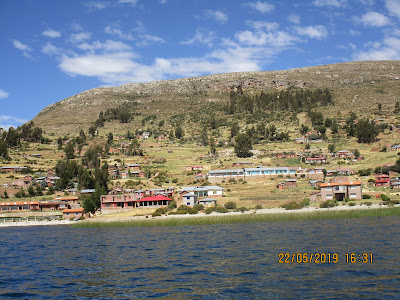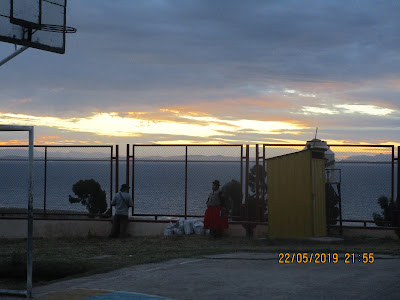Henry and I took our group's water in a tuk tuk and I was able to sit at the port waiting for the others to arrive. They all had to buy some provisions for our homestay hosts and then they joined me. Getting on the boat was a rather precarious manoeuvre for me. It involved crossing over 3 other boats. Fortunately there was help available!
Our first stop was one of the Uros floating islands where everyone but me got out. I was worried that my balance on these far from solid islands, where the ground feels unstable and spongy, would cause me to fall so I observed proceedings from the boat as the others climbed out saying "Wariki" as Oswaldo had trained us to do, in greeting.
The Uros Islands are a group of 62 artificial Lake Titicaca islands. To make them totora reeds (everywhere in the lake) are collected and their dense roots woven together to form a sturdy layer. To hold them in place the islands are moored to the bed of the lake using sharp sticks and ropes. To maintain the islands new reeds are continuously added to the top layer to replace the bottom layers which dissolve into the water. Ironically tourism, which the islanders depend on, is the cause of the layers dissolving and creates much more work for the islanders. While the inhabitants of the Uros islands look quite primitive they have embraced modern technology using solar panels to power electronic devices such as tvs and mobile phones.
This is how they dry the totora reed that they use to build their island, houses and boats.
A bedroom on the island.
Totora reed boats. They all have cat faces/heads - I don't know why but might have asked if I had been well enough to get off the boat.
Our group enjoying their trip on the 2 decker reed boat. While they were busy doing that I was entertaining one of the female islanders who joined me on my boat to try to sell me some of her wares. I succumbed and bought a cushion cover which is very nice.
We then set off for Taquile island, a little mound island in Lake Titicaca. Going for lunch involved a big climb so I remained on the boat and Henry promised to bring me back some lunch when he would be bringing some for the captain. Taquile Island is known for the quality of its knitted textiles. Only the men of the island do the knitting. Women do the weaving. Young boys learn how to knit at the age of 8. When a man wants to court a young woman he has, first of all, to impress her father of his ability to knit well. If successful he moves in with the girl and they have a trial marriage for a year.
Above Oswaldo our local guide for this part of our trip. Charlotte was taking a rest. She told me she thought she would die on the climb.
This is the group making their way up to the school.
It was about 5.30 pm and the sun was setting.
Some of the group played football with the locals.
Antonio dressed Jim for the ceremony. He looks far from comfortable in it!I declined the invitation to get dressed in traditional costume as I knew I wouldn't be able to stand long enough for Antonio to get it on me.
Charlotte and Sarah looking well!
It was hilarious watching Jim trying to dance. He just kept twirling his pompoms despite having been shown what to do.
As Antonio had taken our rucksack to his house before coming up to the school we did not have our torches for lighting the way back down to the house. However, Antonio used the torch on his mobile phone. At his house we were shown into our ensuite bedroom which was very basic but adequate. There were 2 beds on wine painted concrete floor At about 7pm Antonio knocked on the door. That was our cue to go to the kitchen for dinner. We brought our gifts - rice and oil and a handmade baby blanket that I had made and brought with me. I was apprehensive about the suitability of the blanket as Antonio was too old to be the father of a baby. In the kitchen we met Irma, our Peruvian "mama". We handed over our gifts and when she saw the blanket she said "Oh Lucas". It turned out that she has a 4 month old grandson. That opened a sort of conversation though it was difficult as we had no Spanish, no Quechua and no Aymara which was their language. They had only a word or two of English. At any rate Irma showed us photos of her grandchildren and we smiled a lot at each other. Dinner was semolina and vegetable soup followed by rice and vegetable stew. I could eat only a little and said "pochito". After dinner we went back to the bedroom and had no option but to go to bed. The electricity went off for a few minutes but came back on again. The beds were comfortable and had about 8 Peruvian blankets which were very heavy but we needed them because it was very cold. During the night I got a cramp in my leg and couldn't get out quickly because of the weight of the blankets. Jim also got a cramp at the same time! I had more cramps in between frequent trips to the loo. I didn't sleep but I was warm enough.





















































No comments:
Post a Comment